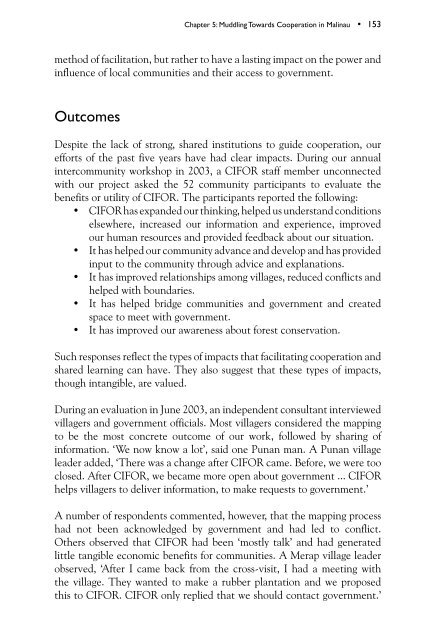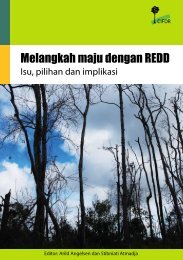Adaptive collaborative management of community forests in Asia ...
Adaptive collaborative management of community forests in Asia ...
Adaptive collaborative management of community forests in Asia ...
You also want an ePaper? Increase the reach of your titles
YUMPU automatically turns print PDFs into web optimized ePapers that Google loves.
Chapter 5: Muddl<strong>in</strong>g Towards Cooperation <strong>in</strong> Mal<strong>in</strong>au • 153<br />
method <strong>of</strong> facilitation, but rather to have a last<strong>in</strong>g impact on the power and<br />
<strong>in</strong>fluence <strong>of</strong> local communities and their access to government.<br />
Outcomes<br />
Despite the lack <strong>of</strong> strong, shared <strong>in</strong>stitutions to guide cooperation, our<br />
efforts <strong>of</strong> the past five years have had clear impacts. Dur<strong>in</strong>g our annual<br />
<strong>in</strong>ter<strong>community</strong> workshop <strong>in</strong> 2003, a CIFOR staff member unconnected<br />
with our project asked the 52 <strong>community</strong> participants to evaluate the<br />
benefits or utility <strong>of</strong> CIFOR. The participants reported the follow<strong>in</strong>g:<br />
• CIFOR has expanded our th<strong>in</strong>k<strong>in</strong>g, helped us understand conditions<br />
elsewhere, <strong>in</strong>creased our <strong>in</strong>formation and experience, improved<br />
our human resources and provided feedback about our situation.<br />
• It has helped our <strong>community</strong> advance and develop and has provided<br />
<strong>in</strong>put to the <strong>community</strong> through advice and explanations.<br />
• It has improved relationships among villages, reduced conflicts and<br />
helped with boundaries.<br />
• It has helped bridge communities and government and created<br />
space to meet with government.<br />
• It has improved our awareness about forest conservation.<br />
Such responses reflect the types <strong>of</strong> impacts that facilitat<strong>in</strong>g cooperation and<br />
shared learn<strong>in</strong>g can have. They also suggest that these types <strong>of</strong> impacts,<br />
though <strong>in</strong>tangible, are valued.<br />
Dur<strong>in</strong>g an evaluation <strong>in</strong> June 2003, an <strong>in</strong>dependent consultant <strong>in</strong>terviewed<br />
villagers and government <strong>of</strong>ficials. Most villagers considered the mapp<strong>in</strong>g<br />
to be the most concrete outcome <strong>of</strong> our work, followed by shar<strong>in</strong>g <strong>of</strong><br />
<strong>in</strong>formation. ‘We now know a lot’, said one Punan man. A Punan village<br />
leader added, ‘There was a change after CIFOR came. Before, we were too<br />
closed. After CIFOR, we became more open about government ... CIFOR<br />
helps villagers to deliver <strong>in</strong>formation, to make requests to government.’<br />
A number <strong>of</strong> respondents commented, however, that the mapp<strong>in</strong>g process<br />
had not been acknowledged by government and had led to conflict.<br />
Others observed that CIFOR had been ‘mostly talk’ and had generated<br />
little tangible economic benefits for communities. A Merap village leader<br />
observed, ‘After I came back from the cross-visit, I had a meet<strong>in</strong>g with<br />
the village. They wanted to make a rubber plantation and we proposed<br />
this to CIFOR. CIFOR only replied that we should contact government.’
















